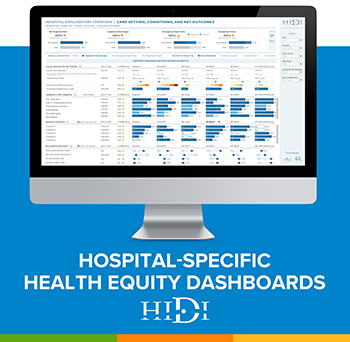Expert

Christy Carel
Actions
Type
Topic
- Governance
Tags
Trustee Matters highlights important health care topics, with special attention to emerging issues in health management and governance.
Health Equity — Why Now and Where to Begin?
MHA Contact: Mat Reidhead
BACKGROUND: Effective Jan. 1, 2023, The Joint Commission and Centers for Medicare & Medicaid Services integrated health care equity standards into their health care accreditation and Inpatient Quality Reporting payment programs. The 2023 Hospital Inpatient Prospective Payment System final rule includes the term “health equity” 259 times, “social determinant” 59 times and its shorthand, “SDOH,” 97 times in the 2,087-page rule. In other words, CMS is leveraging its status as the single largest purchaser of health care in the U.S. to compel hospitals to the health equity table.
WHY NOW? While the renewed focus and attention to closing the gap in equitable health outcomes in the U.S. is new, the existence of health disparities and their devastating effects for vulnerable communities of all stripes, is not. The genesis of health disparity research dates to 1714 Italy, and the intersection of health disparities and SDOH has been studied since its original discovery in 1840 England.
Nearly two centuries later, we still see communities across Missouri that are, at times, separated by a few miles, but have nearly 30-year differences in average life expectancy at birth. Additionally, Black mothers in Missouri die at triple the rate of their white neighbors during the year following childbirth, while new mothers with Medicaid are eight times as likely to die following childbirth compared to their neighbors with private health insurance.
In its purest form, health equity is a societal state where everyone — regardless of appearance, access, assets or influence — has a fair and just opportunity to be as healthy as they choose. The continued existence of these profound disparities in the most affluent civilization in history cannot be considered fair or just by any observer.

WHERE TO BEGIN? Both CMS and TJC requirements emphasize data collection, stratification and analysis. To comply and improve, hospitals first must gain visibility into the health-related social needs of their specific patient populations, in addition to differences in health outcomes experienced by different sociodemographic cohorts. To assist Missouri’s hospitals in rising to and exceeding this challenge, the Hospital Industry Data Institute — the data company of MHA — recently released a set of hospital-specific health equity dashboards designed first to assist with identifying and addressing finite sources and drivers of disparity within patient populations, and secondarily, to assist member hospitals with satisfying components of the new rules related to data collection and stratification.
Medicaid Reverification Begins in April
MHA Contact: Brian Kinkade
Beginning in March 2020 and continuing throughout the COVID-19 public health emergency, federal law has prohibited states from removing individuals from Medicaid coverage in exchange for a 6.2% increase in the federal funding match rate states receive for their Medicaid expenditures. In Missouri, the disenrollment prohibition caused Medicaid caseload to swell more than 70% to 1.4 million, while the enhanced FMAP injected nearly $2 billion into the state treasury.
The Consolidated Appropriations Act of 2023 ends the COVID-19 continuous Medicaid requirement as of Friday, March 31, and phases out the enhanced Medicaid match by Dec. 31. The act also requires states to reverify the eligibility of all Medicaid participants by June 30, 2024. This mandate to resume regular verification of Medicaid participants’ eligibility is commonly referred to as the “unwinding” of the COVID-19 continuous coverage policy.
The state will conduct reverifications of current participants based on the month in which their eligibility would have been reviewed had the COVID-19 PHE prohibition not been in place. This approach will mean that the state’s reverification effort will be spread throughout the next 12 months and will be completed by June 30, 2024.
It is unclear how many individuals covered by Medicaid today no longer meet the eligibility criteria for ongoing Medicaid coverage. There is concern that outdated contact information, complicated instructions and miscommunication will cause participants to either lose Medicaid coverage even though they are qualified or not transition to no-cost/low-cost coverage through the federal marketplace if they do not qualify for Medicaid.
The state agency has taken steps to prepare for the unwinding, including a months-long effort to update contact information, as well as implement new policies and technologies that are designed to expedite and automate the verification of participants’ eligibility.
In addition, MHA staff is providing hospitals with guidance on the actions hospitals can take and resources available to them to help their Medicaid-covered patients avoid becoming uninsured as a result of the upcoming unwinding. These resources are accessible on MHA’s website, which will be updated as new information on the state’s reverification effort is available.
Our goal is to help leverage the combined efforts of the state, hospitals and other health care providers, and health care advocates to ensure citizens who qualify for Medicaid health care coverage do not lose it during the unwinding process.
Support MHA’s 2023 Political Action Campaign
MHA Contact: Christy Carel
MHA’s political action committee fundraising campaign is an important component of the association’s advocacy program.
MHA supports three PACs — HEALTHPAC contributes to state-level candidates, AHAPAC is the PAC of the American Hospital Association that contributes to federal candidates and PAC of MHA also contributes to federal candidates. These PACs allow the hospital community to speak with one unified voice and support candidates who understand the complex issues hospitals tackle each and every day.

MHA’s 2023 fundraising campaign has a member-hospital goal of $150,000 for HEALTHPAC and $52,700 for AHAPAC.
To meet this goal, it is essential for individuals from each member hospital, including hospital trustees, to participate. The 2023 campaign began March 6, and we encourage you to contact your hospital CEO about participating.
Thank you for the important work you do on behalf of your hospital and community.
AHAPAC may accept contributions only from managerial employees, including trustees. Anyone may contribute to HEALTHPAC. Contributions are voluntary, and individuals are free to refuse to contribute without reprisal.
MHA Awards
MHA is offering three prestigious awards to recognize the sustained improvements of its member hospitals — the Aim for Excellence Award, the Visionary Leadership Award and the Trustee of the Year Award. All awards will be presented during MHA’s Annual Convention in November.
The application and nomination forms can be found at the respective links. The deadline to apply and/or nominate is 5 p.m. Friday, May 12.

2023 Trustee of the Year Award
The Trustee of the Year Award honors up to two trustees who currently serve, or who served within the past year, on a Missouri hospital or health system governing board for their dedication and engagement in their hospital’s activities.

2023 Aim for Excellence Award
The Aim for Excellence Award recognizes Missouri hospitals’ innovation and outcomes related to the Triple Aim approach. Utilizing this approach, hospitals can improve the individual experience of care and the health of populations, and reduce per capita costs of care.

2023 Visionary Leadership Award
The Visionary Leadership Award recognizes outstanding achievements in clinical and health outcomes led by the nominee. New this year, eligibility has been expanded to include members of hospital or health system senior leadership.
Education
April 25 — Are You RansomWary Enough?
- 10 to 11: 30 a.m. | Virtual | Register
May 23 — Strengthening the Organizational Immune System for a Sustainable Future: The Power of Strategic Resilience and Healthy Leadership
10 to 11 a.m. | Virtual | Register
On-Demand Education
The MHA Health Institute offers cost-effective learning opportunities for both members and nonmembers to help them understand and address emerging issues, learn and share best practices, and comply with legal and regulatory requirements. Learn more.















